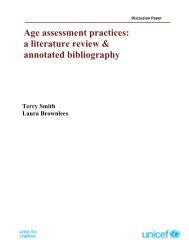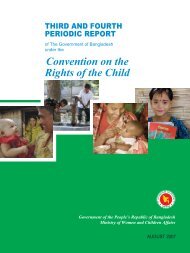Government-funded programmes and services for vulnerable - Unicef
Government-funded programmes and services for vulnerable - Unicef
Government-funded programmes and services for vulnerable - Unicef
Create successful ePaper yourself
Turn your PDF publications into a flip-book with our unique Google optimized e-Paper software.
<strong>Government</strong>-<strong>funded</strong> <strong>programmes</strong> <strong>and</strong> <strong>services</strong> <strong>for</strong> <strong>vulnerable</strong> children in SA<br />
➔<br />
subsidised up to a<br />
maximum of 80%<br />
(R48 per household)<br />
of the monthly service<br />
fee. ii The subsidy <strong>for</strong><br />
off-grid users is paid<br />
directly to the service<br />
providers, meaning<br />
that households only<br />
have to make a cash<br />
payment of R18 per<br />
month.<br />
A household is defined<br />
by the Department as<br />
‘a residential customer<br />
with an official point of<br />
electrical supply’. iii<br />
Notes:<br />
(i) DoME (2003)<br />
(ii) <strong>and</strong> (iii) Free basic electricity, http://www.dme.gov.za/energy/elect_fbe.stm<br />
Some key policy <strong>and</strong> service delivery gaps<br />
Households not connected to the grid<br />
Many poor households are not connected to the grid, either through electrification or<br />
approved solar home systems, meaning that they do not benefit from free basic energy<br />
supplies. 98<br />
The 2009 General Household Survey indicates that 82.6 per cent of households are<br />
connected to an electricity supply. However, in the Eastern Cape <strong>and</strong> Limpopo province,<br />
there is still high usage of wood <strong>and</strong> paraffin as a source of energy (Stats SA 2010a).<br />
Free 50 kWh insufficient<br />
The allocation of free 50 kWh of electricity per month, as per the free basic electricity<br />
programme, is premised on the assumption that this is the amount of energy an average<br />
household consumes per month, <strong>and</strong> that it is enough to meet the needs <strong>for</strong> ‘lighting,<br />
media access <strong>and</strong> limited water heating <strong>and</strong> basic ironing (or basic cooking) <strong>for</strong> a poor<br />
household’ (DoME 2003: 9). This is contested by consumer <strong>and</strong> activist groups who claim<br />
that the average monthly household usage is much higher. As a result, the 50 kWh does<br />
not meet their needs <strong>and</strong> poor households are then <strong>for</strong>ced to use firewood <strong>and</strong> paraffin<br />
when they have used up their free basic electricity (Malzbender 2005).<br />
98 NGOs to March <strong>for</strong> Free Basic <strong>and</strong> Clean Electricity, October 2008, Sangonet pulse, http://www.ngopulse.org/pressrelease/ngos-march-free-basic-<strong>and</strong>-clean-electricity-0<br />
194
















